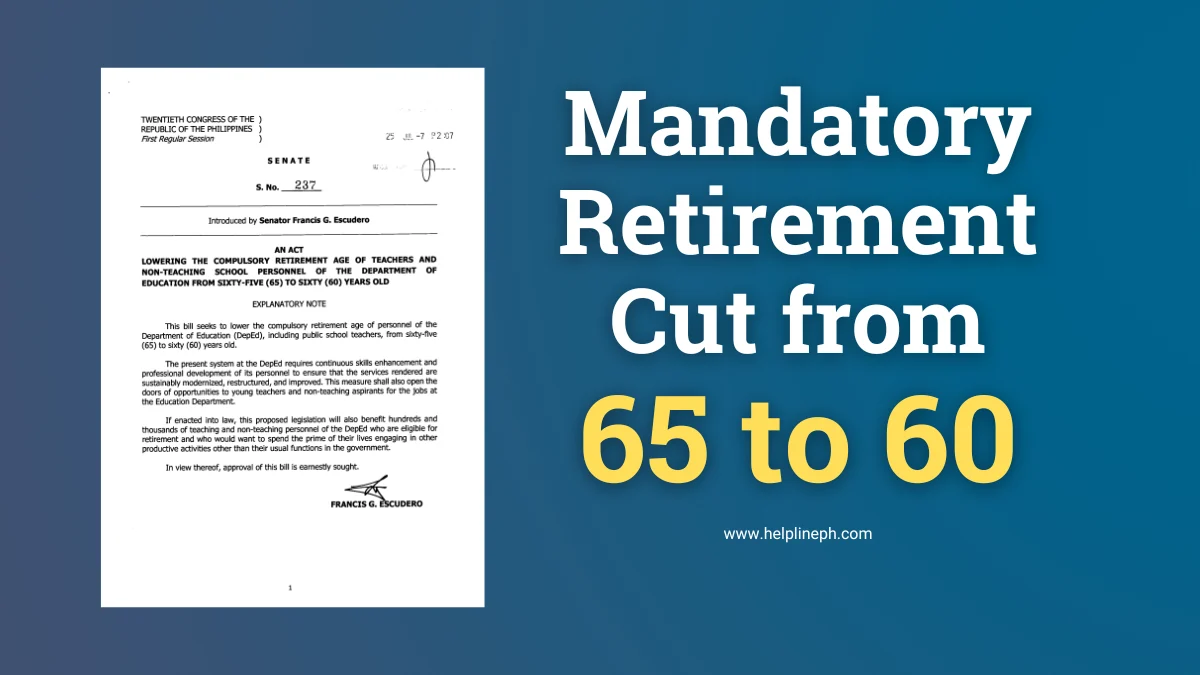Mandatory retirement age is now a hot topic in the Philippines. A new Senate bill—S. No. 237—proposes lowering the compulsory retirement age for Department of Education (DepEd) personnel from 65 to 60 years old . This change aims to modernize education, open chances for younger teachers, and help older staff enjoy their later years.
Why Change the Retirement Age?
Keeping Education Fresh
Younger teachers often bring new ideas and teaching methods. By setting the retirement age at 60, schools can regularly welcome educators who use up-to-date technology and fresh lessons. This helps students learn in ways that match today’s fast-changing world.
Opportunity for Advancement
Lowering the retirement age opens more vacancies each year. Aspiring teachers and staff who waited in line can finally get jobs. This means more chances for career growth, especially for new graduates or mid-career changers.
Well-Deserved Rest for Older Staff
After decades of service, many teachers and staff look forward to retirement. Retiring at 60 gives them time to travel, spend time with family, or start new hobbies while they are still active and healthy.
Key Points of Senate Bill S. No. 237
Compulsory Retirement at 60
- All DepEd teachers and non-teaching personnel must retire upon turning 60 years old.
Grace Period for Short Service
- Employees with less than 15 years of government service can opt to stay until 65, following existing civil service rules.
Repealing Old Rules
- Any law, order, or rule that conflicts with this new age limit will be repealed.
Effectivity
- The law takes effect 15 days after being published in the Official Gazette or two newspapers of general circulation.
Benefits of the New Retirement Age
Improved Service Quality
Shorter careers can encourage teachers to keep honing their skills. With a clear end-date, many will seek more training, workshops, or advanced degrees early in their careers.
Health and Well-Being
Retiring at 60 lets educators enjoy better health and energy. Many people find it easier to travel, volunteer, or learn new skills in their early 60s.
Economic Boost
Opening jobs faster can reduce unemployment. New hires bring income to local communities through rent, shopping, and more.
Possible Concerns and Answers
| Concern | Answer |
|---|---|
| Loss of experienced teachers | Affected personnel can mentor younger staff before they retire. Professional development programs will ensure smooth hand-overs. |
| Pension and benefits adjustments | Pensions will still be based on years served. Those retiring at 60 with full credits will receive full pensions. |
| Staffing gaps in rural or remote areas | The DepEd can offer extension options under special rules for hard-to-fill schools. |
My Personal Story
When I was a young teacher, I sat in a staff room beside a colleague who had taught for 40 years. She had so many stories and skills, but she often felt tired handling new tech tools. I wished then that we could bring in younger teachers to share the workload and fresh ideas. Now, with this bill, I feel hopeful. Soon, classrooms will buzz with both seasoned wisdom and energetic innovation.
How the Bill Moves Forward
Committee Review: Senators study the bill’s details and may hold hearings.
Senate Vote: If approved, it goes to the House of Representatives.
House Debate: Representatives discuss, amend, and vote.
President’s Signature: Once both chambers agree, the bill is sent to the President.
Publication: Fifteen days after publication, the law takes effect.
Frequently Asked Questions (FAQs)
What happens to teachers already over 60?
They continue teaching under current rules until they choose to retire or reach age 65 if they have fewer than 15 years of service.
Will pensions change?
No. Pensions still depend on total years served, not just age. Teachers retiring at 60 with full service credits receive full benefits.
Can remote schools delay the cut-off age?
Yes. The DepEd may grant extensions or deferments for schools in remote or conflict-affected areas.
When will the law start?
Fifteen days after publication in the Official Gazette or two newspapers of general circulation.
How does this affect private school teachers?
This bill applies only to DepEd personnel. Private schools set their own retirement rules.
Summary and Call to Action
Lowering the mandatory retirement age from 65 to 60 can refresh our school system, open new job openings, and let veteran staff enjoy a well-earned rest. As a teacher and lifelong learner, I welcome this bold step. I urge every citizen to follow the bill’s progress and share your thoughts with lawmakers. Together, we can build a stronger, modern education system that values both experience and innovation.






